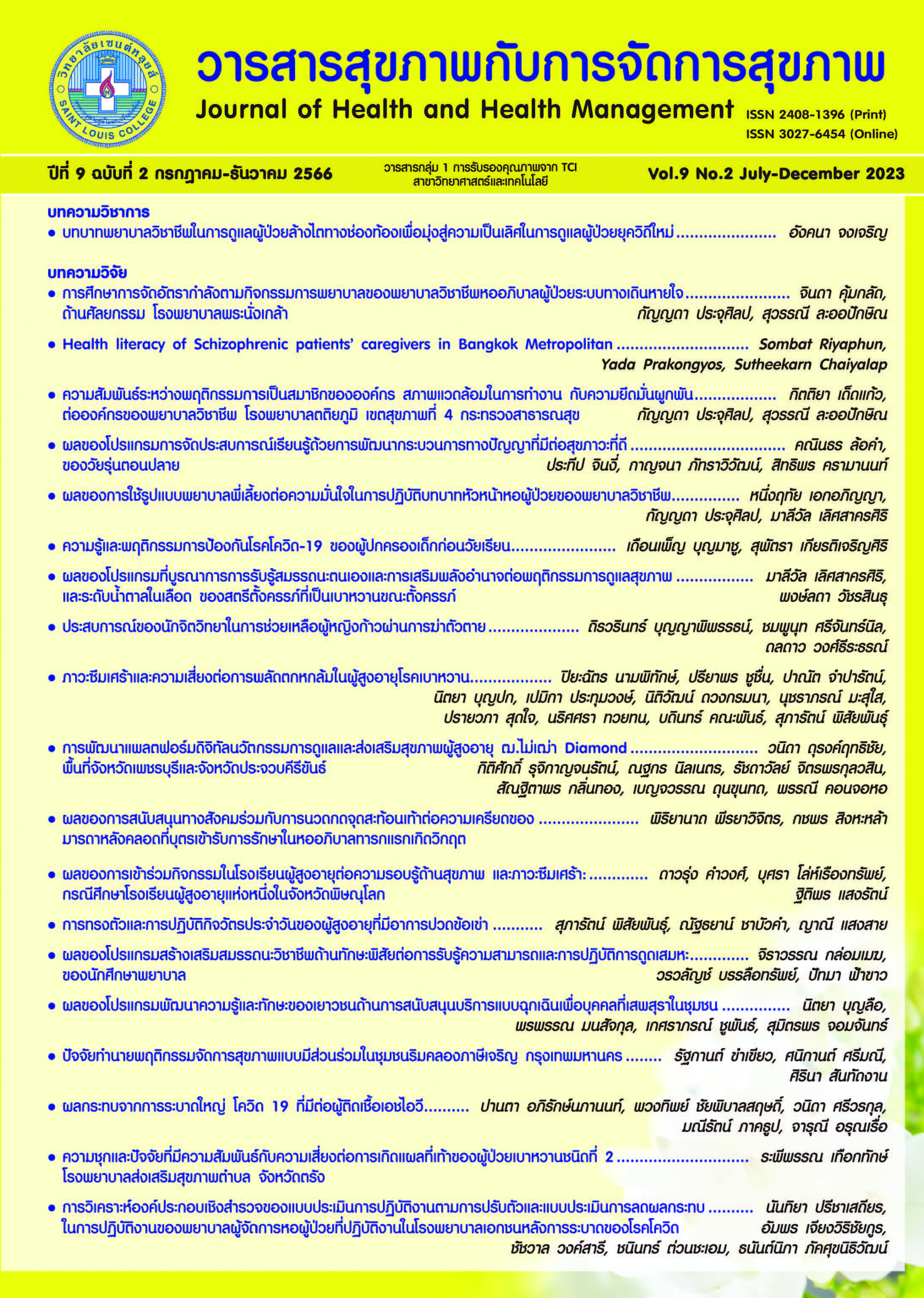Effects of Elderly School Attendance on Health Literacy and Depression: A Case Study of Elderly School in Phitsanulok Province
Keywords:
Elderly School, Health Literacy, DepressionAbstract
This descriptive study aimed to compare the level of health literacy (HL) and depression between the elderly who participated in an elderly school (Elderly school group) and those in the community who did not (Community group). Each group included 40 elderly individuals with non-communicable diseases. Data were collected between December, 2021 and March, 2022 using an HL questionnaire for diabetes and hypertension and the Thai version of the 15-item Geriatric Depression Scale (TGDS-15) to assess HL and depression, respectively. Descriptive statistics were used to characterize the data. Chi-square tests was conducted to compare the difference in HL and depression levels. The study found that, there were no significant differences in overall HL level between Elderly school group and Community group. However, the HL enlightenment level among the Elderly School Group were statistically significant higher (p-value=0.007) when accessing or seeking health information compared to the Community Group. There were no significant differences in depression between the two groups. This study highlights the potential of elderly school participation, particularly for enhancing health literacy regarding access or seek to health information among the elderly. These results can serve as a valuable guide for local organizations, particularly those focused on enhancing the capabilities of the elderly, in supporting relevant activities in future contexts.
References
กรมกิจการผู้สูงอายุ. (2559). คู่มือโรงเรียนผู้สูงอายุ. สืบค้นจาก https://www.dop.go.th/download/knowledge/th1605680859-197_0.pdf
กรมกิจการผู้สูงอายุ. (2562). มาตรการขับเคลื่อนระเบียบวาระแห่งชาติ เรื่อง สังคมสูงอายุ 6 Sustainable 4 Change. สืบค้นจาก https://www.dop.go.th/th/know/5/155
ชะนวนทอง ธนสุกาญจน และนรีมาลย์ นีละไพจิตร. (2559). การพัฒนาเครื่องมือวัดความรู้แจ้งแตกฉานด้านสุขภาพ (Health Literacy) สำหรับผู้ป่วยโรคเบาหวานและความดันโลหิตสูง. นนทบุรี: กรมสนับสนุนบริการ สุขภาพ กระทรวงสาธารณสุข.
ดาวรุ่ง คาวงศ์ และสุรวิชญ์ รุ่งสว่าง. (2563). การวิเคราะห์เนื้อหาวิชาที่มีการจัดการเรียนการสอนในโรงเรียนผู้สูงอายุเพื่อเปรียบเทียบกับโครงสร้างหลักสูตรของกรมกิจการผู้สูงอายุ: กรณีศึกษาโรงเรียนผู้สูงอายุบ้านเขาสมอแคลง จังหวัดพิษณุโลก. วารสารวิชาการสาธารณสุขชุมชน, 6(2), 1-12.
ปัญจพจน์ วิมลรัตนชัยศิริ. (2563). การศึกษาเปรียบเทียบพฤติกรรมส่งเสริมสุขภาพและคุณภาพชีวิตของผู้สูงอายุที่เข้าร่วมและไม่ได้เข้าร่วมกิจกรรมในชมรมผู้สูงอายุตำบลสามชุก อาเภอสามชุก จังหวัดสุพรรณบุรี. วารสารวิทยาลัยพยาบาลบรมราชชนนี สุพรรณบุรี, 3(2), 52-75.
มนัส จันทร์พวง, วิยะณี ดังก้อง, ปาริฉัตร กุลเกลี้ยง, สุภาพร ธนะขว้าง, ณัฐกมล บัวบาน, และเอกภพ นิลพัฒน. (2560). การพัฒนาหลักสูตรโรงเรียนผู้สูงอายุเพื่อเพิ่มคุณภาพชีวิตผู้สูงอายุด้วยภูมิปัญญาท้องถิ่น. วารสารบัณฑิตศึกษาปริทรรศน์ มจร วิทยาเขตแพร่, 3(1), 87-102.
มูลนิธิวิจัยและพัฒนาผู้สูงอายุไทย. (2560).สถานการณ์ผู้สูงอายุไทย พ.ศ.2560. Retrieved from http://www.dop.go.th/download/knowledge/th1552463947-147_0.pdf
ระวี สัจจโสภณ. (2556). แนวคิดทางการศึกษาเพื่อการพัฒนาภาวะพฤฒิพลังในผู้สูงอายุ. วารสารวิทยาสารเกษตรศาสตร์ สาขาสังคมศาสตร์, 34(3), 471-490.
สรร กลิ่นวิชิต, เวธกา กลิ่นวิชิต, พวงทอง อินใจ, และพลอยพันธุ์ กลิ่นวิชิต. (2558). การประเมินภาวะสุขภาพจิตของผู้สูงอายุที่เป็นโรคเรื้อรังในชุมชน เทศบาลเมืองแสนสุข จังหวัดชลบุรี. บูรพาเวชสาร, 2(1), 21-33.
อุบล นววงศ์เสถียร และนิตยา แก้วคำสอน. (2561). การพัฒนาหลักสูตรโรงเรียนผู้สูงอายุเพื่อการส่งเสริมสุขภาพผู้สูงอายุกลุ่มติดสังคมตำบลศรีวิไล อำเภอศรีวิไล จังหวัดบึงกาฬ. วารสารวิทยาศาสตร์สุขภาพและการสาธารณสุขชุมชน, 1(1), 70-81.
อาชัญญา รัตนอุบล. (2562). ข้อเสนอการพัฒนาการดำเนินงานส่งเสริมศักยภาพผู้สูงอายุ. วารสารศิลปากรศึกษาศาสตร์วิจัย, 11(1), 26-46.
Ngamjarus, C., & Chongsuvivatwong, V. (2559). n4Studies: Sample size calculation for an epide- miological study on a smart device. Siriraj Medical Journal, 68, 160–170.
Nilnate, W., Hengpraprom, S., & Hanvoravongchai, P. (2016). Level of health literacy in Thai elders, Bangkok, Thailand. Journal of Health Research, 30(5), 315-321.
Wongpakaran, N., & Wongpakaran, T. (2012). Prevalence of major depressive disorders and suicide in long‐term care facilities: a report from northern Thailand. Psychogeriatrics, 12(1), 11-17.
World Health Organization. (2002). The world health report 2002: reducing risks, promoting healthy life. Retrieved from http://www.informaworld.com/openurl?genre=article&doi=101080/1357628031000116808&magic=crossref||D404A21C5BB053405B1A640AFFD44AE3
Downloads
Published
How to Cite
Issue
Section
License
Copyright (c) 2023 Journal of health and health management

This work is licensed under a Creative Commons Attribution-NonCommercial-NoDerivatives 4.0 International License.




